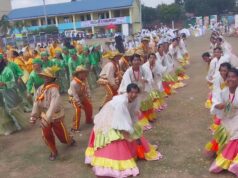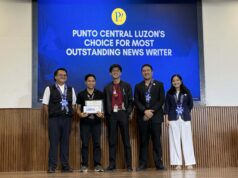MALOLOS CITY—Chinese tourists are coming, prepare the infrastructure.
This summarizes the advice to Filipinos by Chinese Ambassador Liu Jianchao during the briefing on prospect and challenges of Philippines and China in the global economy held at Clark Freeport Zone on Saturday.
He said that with the improving economy, increasing number of Chinese are traveling abroad.
Citing records, Liu said that some 50-million of the 1.3-billion population of China traveled abroad last year, of which, only 220,000 went to the Philippines.
He said that Chinese tourists usually go out of China on the months of January and February, in time for their annual spring festival which is one of the coldest period in their county.
In contrast, the same period is warm in the Philippines which may become the foremost destination of Chinese tourists.
“You must improve tourism infrastructures because Chinese tourists will come to the Philippines in large numbers.
Tourism infrastructures include resorts, hotels, transportation and recreation areas where tourists can use for a certain period.
Liu said that the Philippines has some of the best tourism sites in the world, but needs to further improve facilities.
He cited experience of Chinese tourists who wanted to go to Bohol last year, but decided to travel to other places due to insufficient tourist facilities.
“The hotels in Bohol were already fully booked and Chinese tourists opted to go to other places,” he said.
On the other hand, Liu explained why it is hard for Filipinos to obtain Chinese visas.
He said that since 2008, there were increase incidents of drug trafficking from Manila to China using drug mules.
That is one of the reasons why we became stricter in issuing visas. We demand more documents from applicants to prove that they are normal travelers,” the Ambassador said.
As this developed, proprietors of travel agencies in the country vowed to learn Mandarin, the language commonly used by most Chinese tourists in order to communicate and address tourists needs.
The Angeles University Foundation (AUF) on the other hand said they are offering courses for those interested in learning Mandarin.
AUF is one of the universities in the country that hosts Confucius Institute, a Chinese language and cultural center.
Other Confucius Institute in the country are located at the Bulacan State University in Malolos City, and the Ateneo de Manila University. The fourth will soon be established at the University of the Philippines.
This summarizes the advice to Filipinos by Chinese Ambassador Liu Jianchao during the briefing on prospect and challenges of Philippines and China in the global economy held at Clark Freeport Zone on Saturday.
He said that with the improving economy, increasing number of Chinese are traveling abroad.
Citing records, Liu said that some 50-million of the 1.3-billion population of China traveled abroad last year, of which, only 220,000 went to the Philippines.
He said that Chinese tourists usually go out of China on the months of January and February, in time for their annual spring festival which is one of the coldest period in their county.
In contrast, the same period is warm in the Philippines which may become the foremost destination of Chinese tourists.
“You must improve tourism infrastructures because Chinese tourists will come to the Philippines in large numbers.
Tourism infrastructures include resorts, hotels, transportation and recreation areas where tourists can use for a certain period.
Liu said that the Philippines has some of the best tourism sites in the world, but needs to further improve facilities.
He cited experience of Chinese tourists who wanted to go to Bohol last year, but decided to travel to other places due to insufficient tourist facilities.
“The hotels in Bohol were already fully booked and Chinese tourists opted to go to other places,” he said.
On the other hand, Liu explained why it is hard for Filipinos to obtain Chinese visas.
He said that since 2008, there were increase incidents of drug trafficking from Manila to China using drug mules.
That is one of the reasons why we became stricter in issuing visas. We demand more documents from applicants to prove that they are normal travelers,” the Ambassador said.
As this developed, proprietors of travel agencies in the country vowed to learn Mandarin, the language commonly used by most Chinese tourists in order to communicate and address tourists needs.
The Angeles University Foundation (AUF) on the other hand said they are offering courses for those interested in learning Mandarin.
AUF is one of the universities in the country that hosts Confucius Institute, a Chinese language and cultural center.
Other Confucius Institute in the country are located at the Bulacan State University in Malolos City, and the Ateneo de Manila University. The fourth will soon be established at the University of the Philippines.




